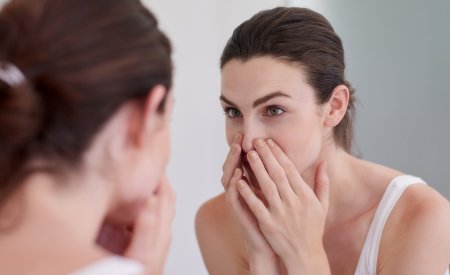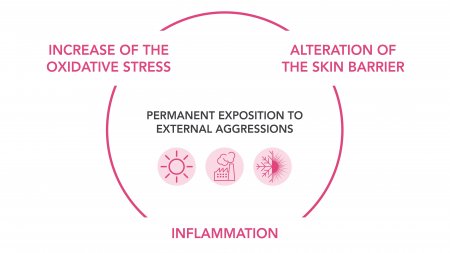Inflammaging: how to prevent premature skin ageing?
Slow down the aging of your skin! Discover the causes of chronic inflammation or inflammaging, its consequences on your skin and solutions to prevent it.

Slow down the aging of your skin! Discover the causes of chronic inflammation or inflammaging, its consequences on your skin and solutions to prevent it.
Skin aging is a natural process that begins around the age of 25. This phenomenon can be amplified by inflammation, known as inflammaging. Inflammaging refers to chronic inflammation that contributes to the premature aging of epidermal and dermal cells. Discover the causes of this inflammation and how to slow it down.
Inflammaging (contraction of inflammation and ageing) is chronic inflammation that accelerates skin aging (link to article). It's a term coined in the early 2000s by Claudio Franceschi, professor of immunology at the University of Bologna.
Symptoms include visible signs of aging on the skin, such as the appearance of wrinkles, fine lines, loss of radiance, dehydration and dryness.

There are two main types of inflammation:
Acute inflammation: this occurs rapidly and lasts only a short time. It is an immediate skin defense mechanism that eliminates the aggressor and repairs damaged tissue.
As explained above, inflammaging is a chronic inflammation that accompanies the body's natural aging process, contributing to premature aging of the skin.
Inflammaging is caused by a number of factors:
These factors act on the cutaneous barrier, making it particularly sensitive and permeable. Weakened, the barrier can no longer play its role as a natural shield, and inflammation can be triggered by external aggression. If these inflammations become constant, we speak of inflammaging.
Skin aging is mainly caused by the following factors:
Antioxidants help defend against the free radicals responsible for oxidative stress. By promoting the absorption of vitamins E, C and A, you can combat the damaging effects of free radicals. Antioxidants are essential for supporting the skin's natural defense system and preventing the visible signs of aging.
Responsible for photo-aging of the skin, the sun is particularly aggressive for the epidermis. If overexposed, UVA and UVB rays can cause permanent damage, leading to the rapid appearance of signs of skin aging. Use appropriate sun protection with SPF 50+ and avoid prolonged exposure during the sunniest hours. Reapply your sunscreen every 2 to 3 hours.
To reduce inflammation, it's important to eat a healthy diet rich in fresh fruit and vegetables, which provide essential antioxidants to slow skin aging.
Exercise to promote good blood circulation. Blood transports oxygen and nutrients to our organs and cells. Energizing our cells helps skin gain firmness and elasticity. Exercise to promote good blood circulation. Blood transports oxygen and nutrients to our organs and cells. Energizing our cells helps skin gain firmness and elasticity.
Learn how to manage stress to limit the production of excess free radicals. Oxidative stress alters the skin's barrier function, resulting in inflammation and sensitization. This sensitivity can accentuate the skin's natural sensitivity.
To effectively protect your skin against premature aging, you need to break the vicious circle of inflammation and damage to the skin barrier.
That's why Bioderma has developed skin care products to provide antioxidant protection and reinforce the skin's natural barrier.
The Sensibio range includes skincare and cleansing products to slow down premature skin ageing:
Defensive riche is another skincare formula developed to moisturize sensitive skin. It is a soothing active cream that boosts the self-defense power of skin dried out by environmental aggressions.